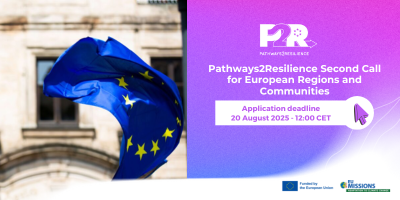The report “Collaborative Climate Action – a prerequisite for more ambitious climate policy”1 was launched in March 2021 through a virtual event hosted by the German Corporation for International Cooperation (GIZ). As part of the Regions4 interviews series, we talked to Ms. Monika Zimmermann, former Deputy Secretary General of ICLEI, Senior Expert on Urban Sustainability and Lead Author of the study, to discuss key aspects of the report and the relevance of regional leadership as well as government collaboration for effective climate policymaking and action.
Regions4 : Ms. Zimmermann, if you had to capture the essence of the report in a headline, what would it be? Why?
Monika Zimmermann: “Little achievement without collaboration.” Our essential statement is that effective and more ambitious climate policy can only be achieved through collaboration. This is particularly true for the vertical or multi-level cooperation within the public sector. Collaborative Climate Action as we define it in the GIZ report is the politically intended, well-organised cooperation across different levels of government to achieve climate goals, which are – ideally – jointly defined and implemented.
R4: What would you say are the main interlinkages and differences between collaborative climate action and multi-level climate governance? What are the main challenges regions may be facing to deliver both and how can they overcome those?
MZ: Collaborative Climate Action (CCA) can be defined in different ways, depending on how much it should describe relations with private actors, such as civil society, academia and business. In our report we focus on the relations between different spheres of government. This approach is very close to multi-level climate governance. The wise interrelation of governmental activities is essential, the set-up of governance structures is a key aspect, even a condition, of this.
Main challenges for regions are similar to main opportunities, due to their “middle position”. I see this as a huge advantage, provided that regional bodies are ready to take up their responsibilities pro-actively and provided they are allowed, enabled and capacitated to unfold climate activities.
R4: The report, commissioned by the GIZ, is meant to be inspirational and a tool for policymakers. What would be the main takeaways to accelerate climate action on the road to COP26 and beyond for regional governments?
MZ: The regional level is positioned between national government and local governments. Depending on competences and responsibilities, the regional level is either a sub-level of national government (as a regional sub division of central government), is a government level on its own (in federal states) or is part of the lowest, local level. In all cases, the regional level has a strong role to play to connect national government and local governments. How they can best use this role depends on their formal status.
From a top-down perspective, regions set rules for targets and processes to reach climate targets locally. They can help to better understand and implement national targets. They can set legal frameworks, provide or manage financial mechanisms, initiate communication campaigns and help the lower levels of government to get their mutual climate cooperation organised.
From a bottom-up perspective, regions can support “their” local governments by setting up governmental cooperation mechanisms, transport their (local) climate initiatives and requests for respective frameworks to the higher levels of government and support municipalities and counties through climate agencies, information, manuals, good practice examples, networking, and similar. Such a “care-taker” role can make the difference between climate declarations in theory and reaching set goals in reality.
Both functions can be best executed if the regional level itself has competences and capacities, including secure revenue sources, staff, access to information, the right to cooperate internationally and a range of instruments at hand.
R4: The report presents both theoretical and practical examples of multi-level climate governance. Which good practices would you specifically highlight?
MZ: Let me share an example from Germany: The 16 States in Germany (Länder) are given a strong role in the governmental system by the constitution. Their political organ is a type of second chamber (Bundesrat). Depending on the subject, they share the law making responsibility with the national parliament. In December 2019, when the German climate law was to be adopted within a package of climate regulations, the Bundesrat signaled that it would not be ready to agree to some parts of this package of regulations. One result of this political move was a relevant increase of the CO2 price being anchored in this climate package.
When the German climate law was finally adopted, half of the 16 Länder already had own state climate laws in place. Thus, we could observe that the regional level was a strong driver of the national debate and had set examples.
The climate law of the State of Baden-Württemberg (of 2013) was already revised in 2020 and is now including an obligation for cities of a certain size to set-up so-called Municipal Heat Plans as a mandatory element of their climate planning.
States set rules for their municipalities in regard to administrative procedures and they determine the building codes, which guide local planning and building permit provision. Again, Baden-Württemberg has gone ahead and has made it mandatory to increase the share of renewable energy for heating and cooling whenever buildings are sold or substantially renovated.
In parallel to the rule-setting, German States have set-up regional climate and energy agencies and they support inter-municipal climate cooperation. They encourage the networking among local governments, facilitate their access to financial means and link their activities to those of the private sector.
R4: Regions4’s flagship initiative RegionsAdapt, an official partner of the Race to Resilience campaign, gathers a community of 71 regional governments paving the way for climate adaptation leadership and action, fostering multilevel governance and cooperation, and reporting on their progress. How do you think global initiatives like RegionsAdapt can help enhance collaborative climate action and institutionalise cooperation?
MZ: Long-term projects such as RegionsAdap are of crucial relevance for various reasons. We need forerunners on all governmental levels, which demonstrate how ambitious and future oriented climate mitigation and adaptation are possible. These forerunners find their peers often in other countries, more than “at home” – such projects allow them to practice cooperation. Vis-à-vis third parties, be they public (eg the European level) or private (eg finance institutes), well organised networks are always more successful than single actors on their own. And furthermore, such projects pioneer new regulations and mechanisms which often become mainstream after an initial test phase.
R4: Finally, how do you think governments can build momentum with the COP26 to achieve the commitments adopted within the Paris Agreement, breaking the silos, and delivering on the global 2030 Agenda leaving no one behind?
MZ: I fully support ICLEI, Regions4 and others to call for a “multi-level COP”. National governments will only be able to reach their climate targets if regional and local actors bring in their full potential. The more, we urgently need to rise climate targets in order to maintain the chance to keep global warming below 1,5 degree. The huge economical and societal transformations can never be achieved without the regional and local levels. The climate cooperation of all spheres of government – beyond differences of interests and parties – is a pre-condition for maintaining an habitable, just, biodiverse and livable planet.
——-
- Zimmermann, M., Lindemann, J., Marmon, T., Meinert, G., & Ziegler, M. (2021).
Collaborative Climate Action – a prerequisite for more ambitious climate policy.
Berlin: Deutsche Gesellschaft für Internationale Zusammenarbeit (GIZ) GmbH.
Website: https://collaborative-climate-action.org/cca-report/



